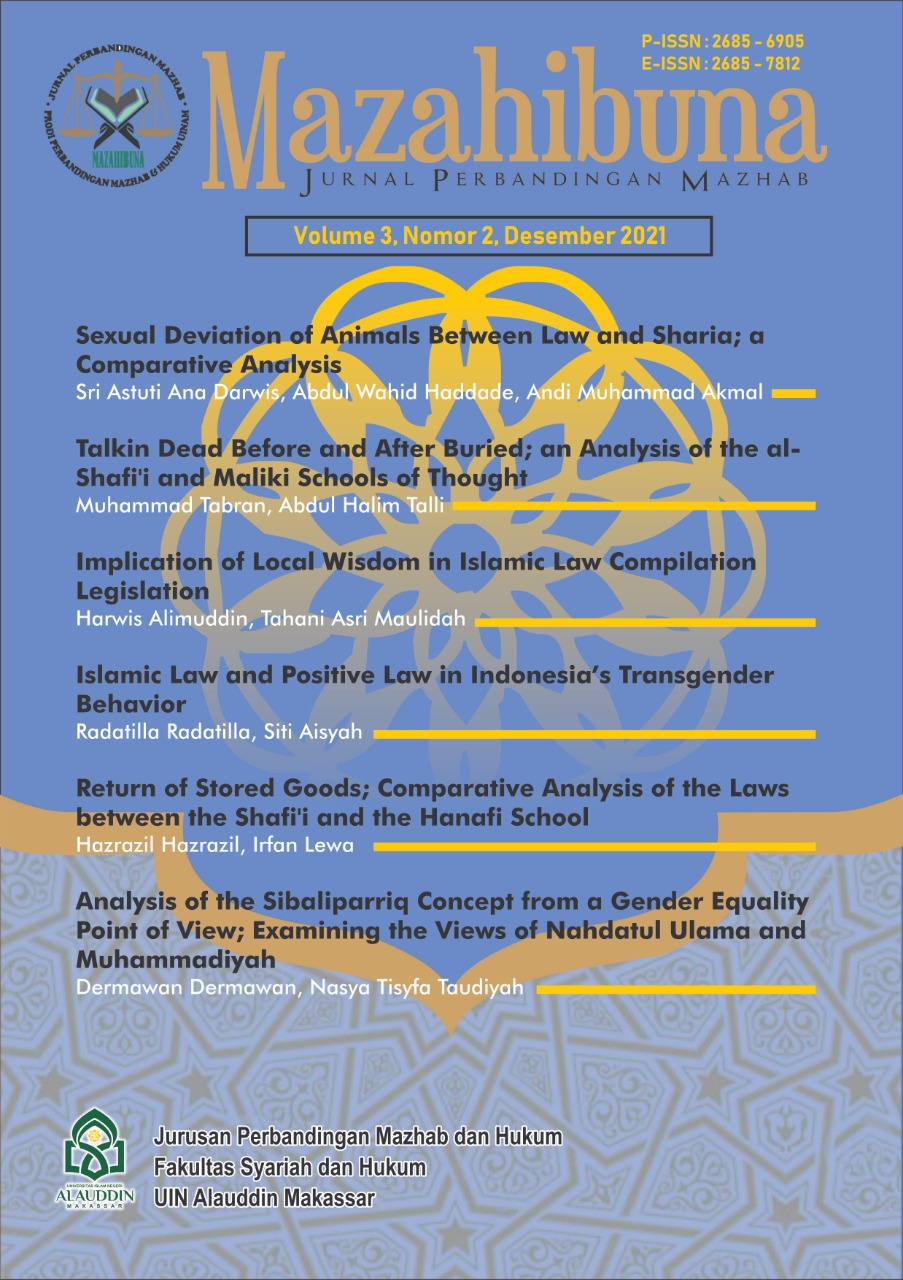Return of Stored Goods; Comparative Analysis of the Laws between the Shafi'i and the Hanafi School
Abstract
This article discusses the punishment for thieves who return stolen goods from the perspective of the Syafi’i school and the Hanafi school. The type of research used by the author in completing this research is qualitative research which is a type of literature research conducted by finding and reviewing written sources such as books and so on. This research uses a juridical normative approach, which is the approach used in relation to the core issues obtained by various sources of literature both primary and secondary or based on the Qur'an, sunnah and consensus of scholars. The results of this study have shown that there are differences and similarities of opinion between the Syafi'I school and the Hanafi school with their respective methods of legal inference. Based on the opinion of the Syafi'i school that if a thief takes the property of another person then the thief gives back the property in a state known to the owner of the goods or not known at all and has been reported to the authorities or not reported then the thief will not escape punishment because it has exceeded two rights, namely the rights of God and human rights. The right of God in question is to violate the command or decree that has been established by God Almighty that stealing is forbidden, and the human right that is violated is to take property that is not his at all. Whereas the Hanafi sect of thieves will not be subject to a limit penalty if the perpetrator returns in circumstances not yet known to the owner and either has been reported or not to the judge. The thief is sentenced to a limit if he returns it after the owner knows because it can cause anger that leads to a limit penalty
References
’Audah, ’Abdul Qadir. Al-Tasyri‘ Al-Jina’i Al-Islami; Muqaranan Bi Al-Qanun Al-Wadh‘i, Jil. II. II. Kairo: Maktabah al-Taufiqiyah, 2013.
Abubakar, Al-Yasa’, and Marah Halim. HukumiPidanaiIslam Di Aceh (Penafsiran Dan Pedoman Pelaksanaan Qanun Tentang Perbuatan Pidana). Banda Aceh: Dinas Syariat Islam, 2011.
Al-Bukhari, Abu ‘Abdullah Muhammad bin Isma‘il. Al-Jami‘ Al-Shahih. I. Kairo: Dar al-Salafiyah, 2004.
Al-Hashari, Ahmad. Al-Siyasah Al-Jinaiyah Al-Hudud Wa Al-Asyribah. Beirut: Dar al-Jail, 1993.
Berutu, Ali Geno. Fikih Jinayah. Purwokerto: Pena Persada, 2020.
Djazuli, A. Fiqih Jinayah (Upaya Menangulangi Kejahatan Dalam Islam). Jakarta: PT Raja Grafindo, 2000.
Hanafi, Ahmad. Asas-Asas Hukum Pidana Islam. IV. Jakarta: Bulan Bintang, 1990.
Haq, Islamul. Fiqih Jinayah. I. Parepare: IAIN Parepare Nusantara Press, 2020.
Kementerian Agama RI. Al-Qur’an Dan Terjemahannya. Jakarta: Lajnah Pentashihan Mushaf Al-Qur’an Badan Litbang dan Diklat Kementerian Agama RI, 2019. doi:10.16309/j.cnki.issn.1007-1776.2003.03.004.
Mardani. “Sanksi Potong Tangan Bagi Pelaku Tindak Pidana Pencurian Dalam Perspektif Hukum Islam.” Ius Quia Iustum Law Journal of Islamic University of Indonesia 15, no. 2 (2018): 253. doi:https://doi.org/10.20885/iustum.vol15.iss2.art7.
Naro, Wahyuddin, Abdul Syatar, Muhammad Majdy Amiruddin, Islamul Haq, Achmad Abubakar, and Chaerul Risal. “Shariah Assessment Toward the Prosecution of Cybercrime in Indonesia.” International Journal of Criminology and Sociology 9 (2020): 572–86. doi:https://doi.org/10.6000/1929-4409.2020.09.5.
Sumardi, Dedi. Hudud Dan HAM Dalam Hukum Pidana Islam. Banda Aceh: Monara Grafika, 2011.
Supardin, and Abdul Syatar. “Adultery Criminalization Spirit in Islamic Criminal Law: Alternatives in Indonesia’s Positive Legal System Reform.” Samarah: Jurnal Hukum Keluarga Dan Hukum Islam 5, no. 2 (2021): 913–27. doi:http://dx.doi.org/10.22373/sjhk.v5i2.9353.
Syatar, Abdul. “Relevansi Antara Pemidanaan Indonesia Dan Sanksi Pidana Islam.” DIKTUM: Jurnal Syariah Dan Hukum 16, no. 1, Juli (2018): 118–34. doi:https://doi.org/10.28988/diktum.v16i1.525.
Syatar, Abdul, and Chaerul Mundzir. TOKOH DAN KETOKOHAN IMAM MAZHAB (Kontribusinya Terhadap Pengembangan Fikih Di Indonesia). Gowa: Alauddin University Press, 2021.
Yunus, Muhammad bin. Ar-Raudh Al Murabbi’. IV. Beirut: Dar Al Kutub Al ‘Ilmiyah, 1998.

This work is licensed under a Creative Commons Attribution 4.0 International License.
Authors who publish with Mazahibuna: Jurnal Perbandingan Mazhab agree to the following terms:
- Authors retain copyright and grant the Mazahibuna: Jurnal Perbandingan Mazhab right of first publication with the work simultaneously licensed under Creative Commons Attribution License (CC BY 4.0) that allows others to share the work with an acknowledgment of the work's authorship and initial publication in this journal.
- Authors can enter into separate, additional contractual arrangements for the non-exclusive distribution of the published version of the work (e.g., post it to an institutional repository or edit it in a book), with an acknowledgment of its initial publication in this journal.
- Authors are permitted and encouraged to post their work online (e.g., in institutional repositories or on their website) before and during the submission process, as it can lead to productive exchanges, as well as earlier and greater citation of published work.

